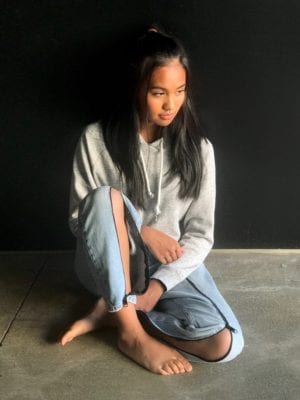By Micaela Bensko For the Signal


Sustainability is a pretty common word these days. Recycling has swiftly become the eleventh commandment and up-cycling the latest in the do-it-yourself craze. Three high school students have taken up-cycling to another level, one overlooking issues affecting our planet created by the fast-fashion industry through their organization called ReEnVogue. Hannah Park, of West Ranch High School, Tiffany Choi and Monai (Mo Mo) Chanon of Granada Hills High School are leading the charge for environmental awareness through change and design.
Nestled in an elbow of storefronts is a flurry of rolling racks, tagged hangers and the trying on and off of clothes, each item transformed to the latest trend by their design. The atmosphere could easily be mistaken for Fashion Week, only in a smaller town with even grander goals. “This was a man’s shirt!” Exclaims Hannah, a designer and executioner of tonight’s fundraiser, a runway show of up-cycled clothing designs benefitting charity and creating a platform for ReEnVogue’s mission – encourage our youth to contemplate the role in protecting the planet in other ways besides recycling plastic and paper.
“It’s our goal to encourage others to choose sustainable fashion – better quality, longer lasting items – over cheap productions to bring awareness to the larger issues behind fast fashion and how they affect our planet ethically, socio-economically, and environmentally”, says Monai. “You see the final product in a store, but are you aware of the cost-cutting dyes used in the fabric that are infecting the drinking waters surrounding a factory and its effect on the children working there? You look in the mirror but do you consider that great price was because of the cheaper fabrics that fall apart after three washes contributing to over 13.1 million tons of fabric and textiles contributing to toxic landfills annually?”
Fast fashion is a term used to describe catwalk-to-storefront clothing designs dependent upon rapid production processes, often overlooking any adherence to quality or ethical reproduction standards with the utilization of inexpensive dyes infiltrating local drinking waters, low-quality short-lasting fabrics contributing to landfills, and child labor abuses ongoing and under-reported.

Hannah continues to assess the fit of her model’s dress, once a man’s shirt, adjusting the elastic that now lays unexpectedly across the collar bones. The general consensus is, it looks like it could be from Urban Outfitters. As lights dim, the models line up in formation and final details tended to, Hannah reflects on her future. “This is just the beginning. I want to leave my fingerprint on this world in a real and tangible way. My goal is to attend Bucknell University with a focus on Marketing, Innovation and Design, so I am truly prepared to leave my mark on how entertainment productions, whether it be an industry event or concert, approach sustainability with their decisions. I would want to know where products used were made, understand the position of the artist in regard to environmental issues and do my part to put an end to the human and environmental atrocities occurring today due to the fast-fashion/production mentality.”
Tiffany adds, “Throughout our research we have discovered atrocities occurring at particular factories in Uzbekistan where they literally inject their female child labor with hormones so they won’t menstruate and ‘stay productive’ as well as striping away their rights to an education if they don’t work in the factories”.
A packed house, music pounding the walls, lights dim and a runway lined in lights sets the mood. Sixty recreations modeled by fellow teens are applauded for so much more than aesthetics, but for everything the mission of ReEnvogue and three inspired and determined minds represent.
Proceeds from the auction of these designs reached over $1,000 and shared between three charities. Girls Not Brides, Fashion Revolution and Labor Behind the Label. The event space donated by Global Prep Academy.













